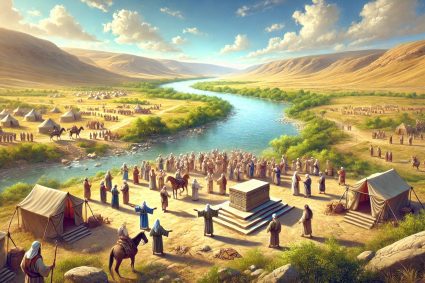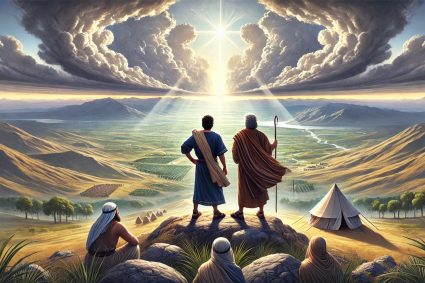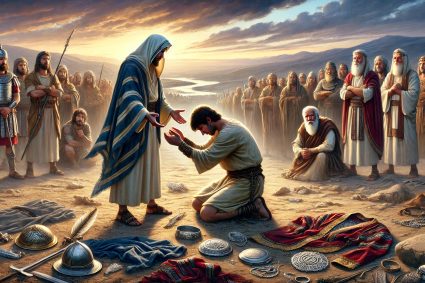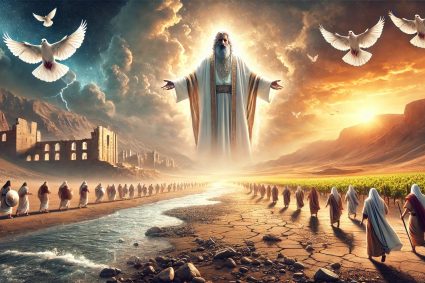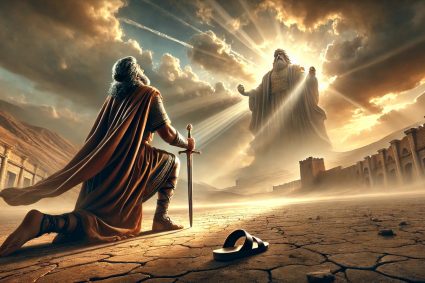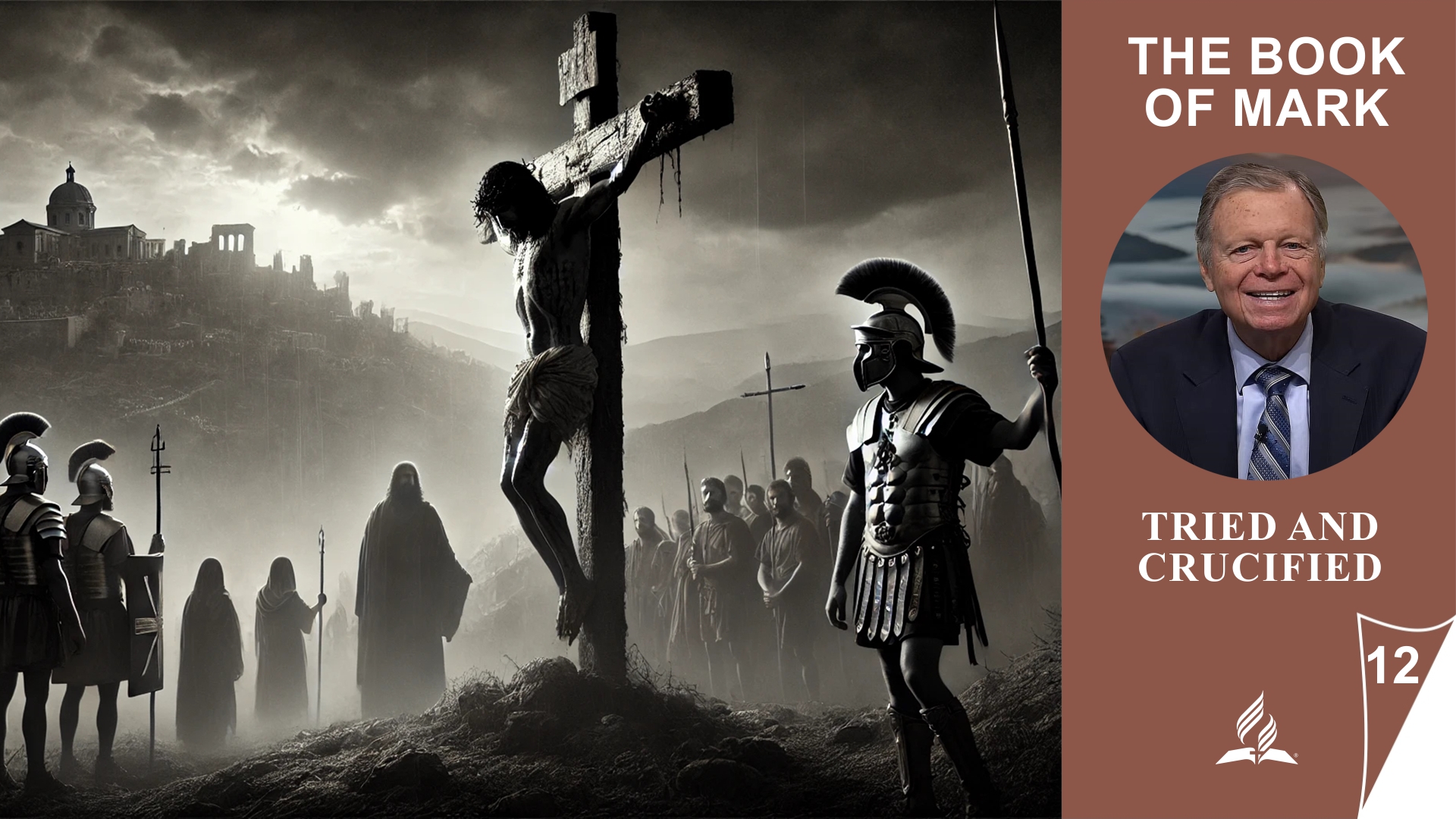
Series THE BOOK OF MARK with Pastor Mark Finley |
Lesson 12.Tried and Crucified |
The Court and the Cross: Jesus’ Sacrifice and the Fulfillment of Redemption |
Lesson 12 deals with the final hours in the life of Jesus, when he was brought to trial, mocked, and ultimately crucified. These events are marked by deep irony, as Jesus is ridiculed as the “King of the Jews” despite being the Messiah and Savior. The narrative demonstrates how biblical prophecies are fulfilled in his suffering and death. Jesus’ death on the cross is not merely a cruel execution but the central event of the Christian redemption story. Through his sacrifice, Jesus enables the reconciliation of humanity with God.
Memory Text: Mark 15:34 – “And at the ninth hour Jesus cried out with a loud voice, saying, ‘Eloi, Eloi, lama sabachthani?’ which is translated, ‘My God, My God, why have You forsaken Me?’ ”
Content:
12.1 “Are You the King of the Jews?”
The Bitter Irony of the King of the Jews: The True Messiah Before the Court
In Mark 15:1–15, several ironic situations are present. Jesus, the true King of the Jews and Messiah, is accused before Pilate as if he were a rebel against the emperor, even though he has come to proclaim the Kingdom of God. Pilate himself asks him if he is the “King of the Jews” but fails to grasp the true meaning of his question. Although Pilate recognizes Jesus’ innocence and wants to release him, he is manipulated by the agitated crowd and the religious leaders. The irony culminates in the fact that while Jesus is condemned as a blasphemer and insurgent, he is actually the true Savior and King whom people should worship.
12.2 Hail, King of the Jews!
The Mocked Royal Dignity: Mockery and Deep Truth in the Ridicule of Jesus
The soldiers mocked Jesus by dressing him in a purple cloak, placing a crown of thorns on his head, and sarcastically greeting him as the “King of the Jews.” These actions imitated the worship of the Roman emperor but did so in a cruel parody. The irony of the situation lies in the fact that Jesus is indeed the king they are mocking, and their sarcastic words speak a deeper truth that they themselves do not recognize. Jesus endured these mistreatments silently, underscoring his royal dignity. Although the soldiers humiliated him, Jesus remains the true king—not only of the Jews but of the entire world.
12.3 The Crucifixion
Saving Weakness: The Bitter Irony of Jesus’ Crucifixion
In Mark 15:21–38, the painful irony is that Jesus, the Savior of the world, appears on the cross as a helpless victim. The religious leaders mock him, saying, “He saved others; he can’t save himself” (Mark 15:31). Yet, by not saving himself, Jesus saves humanity. The soldiers and the crowd ridicule him as the “King of the Jews” without understanding that he is indeed the true king and savior. The brutal scene of the crucifixion tragically shows that Jesus’ apparent weakness is actually his greatest strength—he sacrifices himself to redeem the world.
12.4 Forsaken by God
The Cry of Abandonment: Jesus’ Death as the Key to Redemption
Jesus’ only words on the cross in the Gospel of Mark are, “My God, my God, why have you forsaken me?” (Mark 15:34), known as the “cry of abandonment.” These words not only express deep suffering but also reference Psalm 22, which ultimately conveys hope for God’s intervention. Jesus’ death on the cross signifies that he made the ultimate sacrifice to redeem humanity and pave the way to God, symbolized by the tearing of the temple curtain. Through his death, a new phase of redemption begins, in which the separation between God and humans is removed. Jesus’ apparent abandonment leads to our salvation.
12.5 Laid to Rest
Courage and Testimony: Joseph of Arimathea and the Women at the Tomb
The intervention of Joseph of Arimathea, a respected member of the Sanhedrin, is highly significant because he had the courage to publicly support Jesus when his disciples fled in fear. His request for Jesus’ body and its burial in a new tomb demonstrate his deep reverence and affection for Jesus. Additionally, the account of the official confirmation of Jesus’ death by the Roman centurion counters later speculations. The presence of the women who observed the tomb is crucial, as they become witnesses to the empty tomb and the resurrection.
12.6 Summary
From Mockery to Redemption: Jesus’ Path to the Cross and Its Significance
Lesson 12 focuses on the final hours of Jesus, during which he was brought to trial, mocked, condemned, and ultimately crucified. Despite false accusations and being ridiculed as the “King of the Jews,” Jesus remains silent and accepts his fate to save humanity. The irony of the situation lies in the fact that Jesus is indeed the true Messiah and King, even though people mock him for it. His death on the cross fulfills prophetic writings and ushers in a new phase of redemption. Through Jesus’ selfless death, the way to reconciliation with God is made possible for all people.
(Visited 34 times, 1 visits today)

